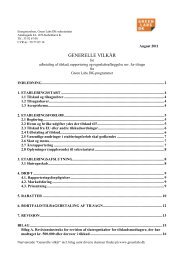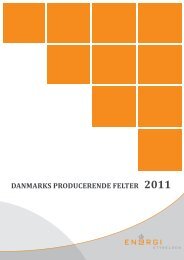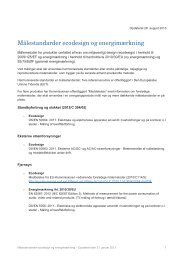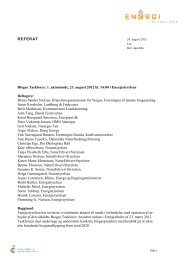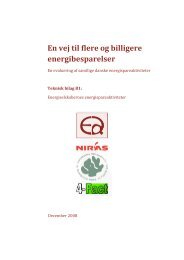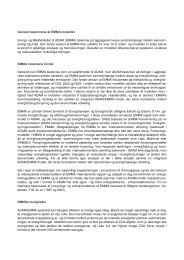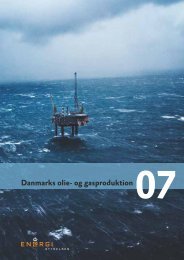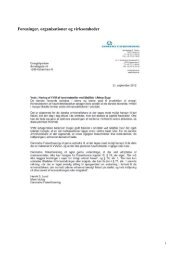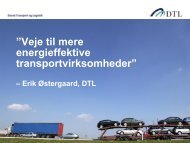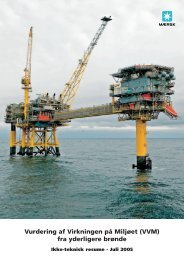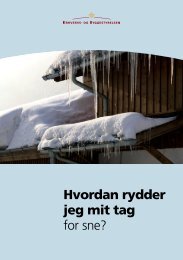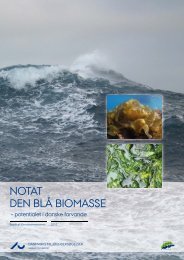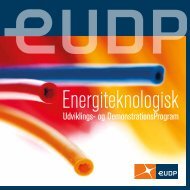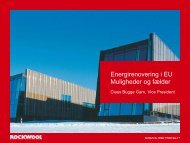Energy Strategy 2050 – from coal, oil and gas
Energy Strategy 2050 – from coal, oil and gas
Energy Strategy 2050 – from coal, oil and gas
Create successful ePaper yourself
Turn your PDF publications into a flip-book with our unique Google optimized e-Paper software.
Background The government will<br />
An efficient <strong>and</strong> environmentally sound<br />
utilisation of North Sea resources<br />
In recent years, <strong>oil</strong> <strong>and</strong> <strong>gas</strong> production in the North Sea<br />
has been crucial for the Danish economy. Since 1995<br />
Denmark has had a surplus on its trading balance for <strong>oil</strong><br />
<strong>and</strong> <strong>gas</strong>, <strong>and</strong> up to 2009 government revenues <strong>from</strong> <strong>oil</strong><br />
<strong>and</strong> <strong>gas</strong> activities have corresponded to more than DKK<br />
250 billion in today’s prices.<br />
This has given economic leeway for more welfare <strong>and</strong> to<br />
the repayment of national debt. At the same time, <strong>oil</strong> <strong>and</strong><br />
<strong>gas</strong> activities have created economic growth <strong>and</strong> a large<br />
number of specialist jobs in <strong>oil</strong> companies, research,<br />
<strong>and</strong> not least in western Denmark, where there are more<br />
than 250 offshore-related companies in the Esbjerg area<br />
alone. This has provided experience <strong>and</strong> knowledge<br />
which could also be developed in connection with future<br />
green offshore activities.<br />
Oil production peaked in 2004, <strong>and</strong> it is expected to<br />
drop by 37% up to 2014 in relation to 2009. Although<br />
North Sea production has been falling in recent years,<br />
it has been estimated that there are still <strong>oil</strong> <strong>and</strong> <strong>gas</strong><br />
resources in the Danish subsurface to contribute to the<br />
economy.<br />
The technology of today only extracts approximately a<br />
quarter of the <strong>oil</strong> lying in the known fields. More effective<br />
exploitation of <strong>oil</strong> <strong>and</strong> <strong>gas</strong> resources as well as new<br />
discoveries could therefore provide government revenues<br />
<strong>and</strong> contribute to securing sound public finances<br />
whilst helping to cover the increasing global dem<strong>and</strong> for<br />
energy.<br />
• Secure a more transparent framework for using the<br />
existing infrastructure in order to improve possibilities<br />
to exp<strong>and</strong> economically marginal <strong>oil</strong> <strong>and</strong> <strong>gas</strong> occurrences<br />
• Implement a review of the framework for <strong>oil</strong> <strong>and</strong> <strong>gas</strong><br />
extraction for future tendering rounds <strong>and</strong> for the use<br />
of CO2 injection to improve extraction rates<br />
• Analyse the exploration potential in Denmark <strong>and</strong><br />
assess when, <strong>and</strong> on what terms, new exploration<br />
licences can be offered (7th round)<br />
• Promote a new phase of the Joint Chalk Research<br />
collaboration between Danish <strong>and</strong> Norwegian authorities<br />
<strong>and</strong> <strong>oil</strong> companies with a view to increasing<br />
<strong>oil</strong> extraction <strong>from</strong> chalk fields<br />
• Promote exploration for new <strong>oil</strong> <strong>and</strong> <strong>gas</strong> fields in<br />
deeper layers through a project led by the Geological<br />
Survey of Denmark <strong>and</strong> Greenl<strong>and</strong> (GEUS) in research<br />
collaboration with <strong>oil</strong> companies. The project<br />
will assess opportunities for new <strong>oil</strong>/<strong>gas</strong> finds <strong>and</strong><br />
reassess existing finds in deep layers<br />
• Negotiate with <strong>oil</strong> companies for a new action plan<br />
to replace the existing plan for more energy efficient<br />
extraction of <strong>oil</strong> <strong>and</strong> <strong>gas</strong> <strong>from</strong> the North Sea<br />
• Examine possibilities to improve <strong>and</strong> coordinate authority<br />
administration of <strong>oil</strong> <strong>and</strong> <strong>gas</strong> activities onshore<br />
• Analyse opportunities to secure recruitment for the <strong>oil</strong><br />
sector through education initiatives in the field of <strong>oil</strong><br />
<strong>and</strong> <strong>gas</strong><br />
• Negotiate a new environment action plan with the<br />
<strong>oil</strong> companies to secure lower environmental impact<br />
<strong>from</strong> <strong>oil</strong> <strong>and</strong> <strong>gas</strong> extraction in the North Sea <strong>and</strong><br />
evaluate <strong>and</strong> possibly revise the strategy for inspection<br />
by the Danish <strong>Energy</strong> Agency of safety <strong>and</strong><br />
health conditions in the North Sea.<br />
<strong>Energy</strong> <strong>Strategy</strong> <strong>2050</strong> <strong>–</strong> <strong>from</strong> <strong>coal</strong>, <strong>oil</strong> <strong>and</strong> <strong>gas</strong> to green energy.<br />
45



